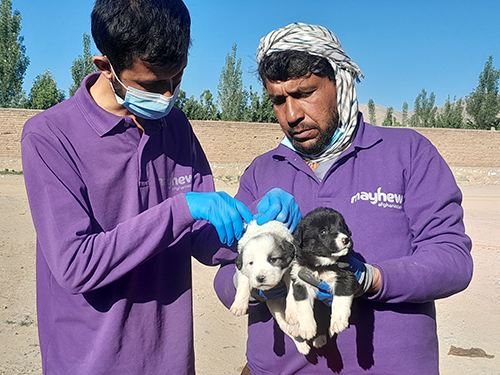Mayhew
Working to eliminate canine rabies in Kabul through mass vaccination of dogs
Based in north London, Mayhew delivers animal welfare initiatives in the UK, Afghanistan and Georgia.
One such project was a six-year, mass canine rabies vaccination programme in Kabul, Afghanistan, which has resulted in no dogs testing positive for rabies in the city since 2021.
 Rabies is endemic in Afghanistan and a major public health concern. Only around 1% of the dog population was vaccinated against the disease and the country was spending US$68m a year on prevention and treatment. Before 2017 the authorities culled the roaming dogs using strychnine poisoning, and in Kabul around 20,000 a year were being killed. This was not only inhumane, but it had no impact on reported human deaths from rabies, which could reach up to 60 each year in the city.
Rabies is endemic in Afghanistan and a major public health concern. Only around 1% of the dog population was vaccinated against the disease and the country was spending US$68m a year on prevention and treatment. Before 2017 the authorities culled the roaming dogs using strychnine poisoning, and in Kabul around 20,000 a year were being killed. This was not only inhumane, but it had no impact on reported human deaths from rabies, which could reach up to 60 each year in the city.
Mayhew gathered baseline data on the dog population, the human population and on dog bites and rabies deaths, and proposed a different strategy: mass neutering and vaccination of dogs, on the condition that the culling stop. The charity suggested that the dog-killers employed by Kabul Municipality be retrained as humane dog-catchers, armed with nets instead of poison.
After gaining support from national and local government for the programme, teams of dog-catchers and vets worked systematically across Kabul, catching, vaccinating, marking and releasing dogs until 70% were immunised. All 22 districts have participated, with a 20km buffer zone around the city added in 2024. Alongside the vaccination activity, Mayhew also rolled out a community engagement initiative to educate residents about rabies prevention.
It was a success: no dogs have tested positive for rabies in Kabul city since 2021, and cases of rabies in humans have steadily declined, with zero cases recorded between April 2023 and January 2024.
The cost was £1.1m, or £8.30 per dog, funded by grants and donations. The investment generated employment and training for vets, dog-handlers and animal care workers.
In 2025 a new contract was signed with the Afghan Ministry of Agriculture, Kabul University and Kabul Municipality to take over delivery of the programme in 2025 and include it in their core budgets going forward. Their focus is now a maintenance programme and campaigns in hotspot areas.
Mayhew is now assessing for a similar project in Tunisia.
Charity Awards judge Sharika Sharma, head of business development at CCLA, commended the effectiveness of the programme, particularly the reduction in human deaths from around 60 a year to zero. “It takes persistence, determination and connection to work somewhere like Afghanistan – especially to work with their authorities and to continue even after the regime change.”
Awards judge Julie Wilson-Dodd, transformation consultant, added: “It’s the scale of the multi-year, systemic change they managed to deliver in such a complex environment that makes it so exceptional.”
CC Reg. no. 1077588
